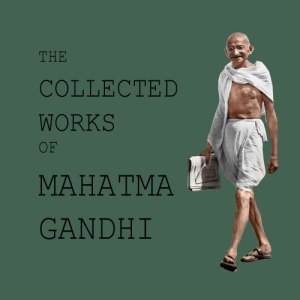Volume XLVI, which is still less than halfway to the end of this hundred or so volume series, collects all that Gandhi wrote and said of which there are records from April 16, 1931 to June 17, 1931.
During this two month period, Gandhi is dealing with breakdowns in the truce with the Viceroy that ended the “salt satyagraha,” and communal strife between the Hindus and Muslims. He has recently been designated the Indian National Congress’s sole representative to the proposed Roundtable Conference on India’s future scheduled for later the same year in London. However, he is indecisive throughout this volume about following through—and in fact leaning pretty strongly against going—because he doesn’t think he should leave India in a time of instability.
So often history is presented in a summarized, simplistic way, when the reality is far more complex. It’s easy to think of India’s independence struggle as a time when Gandhi ran Congress and Congress ran the movement for independence, but really it was all quite tenuous. Even coming off the salt satyagraha when Gandhi’s influence is probably at one of its peaks, he doesn’t have anywhere close to full control of the situation. On a daily basis he’s making speeches, having meetings, writing articles, trying to maintain whatever influence he has over the process, trying to focus his side on continuing his experiments of nonviolence and moral politics, if not on principle like he prefers, at least as a policy more likely to bring about good consequences than any other.
While it’s not true to say he has any kind of crisis of faith during this period, in the sense of doubting the nonviolent approach in general or the ultimate success of the movement for independence, there is much struggle, much soul searching, much self-doubt about his specific choices in implementing nonviolence politically, and about the short term developments. He seems not very optimistic at all, for instance, about the Roundtable Conference, thus his reluctance to even bother attending when he has plenty of work, plenty of delicate negotiations to do in India to keep the peace. He is especially distraught over the continued hostility between Hindus and Muslims.
My impression reading this volume, and reading between the lines, remains that the British are not negotiating in good faith, that they’re making precious few concessions, that they haven’t somehow joined Gandhi on the lofty level of seeking mutually beneficial outcomes through moral means, but are simply pursuing geopolitics the usual ways, if anything seeing Gandhi’s unconventionality as weakness and looking to exploit it. It seems the truce is being violated far more by the government side. Plus when there are problems or alleged problems on the Indian side, Gandhi does everything in his power to bring them back into compliance, whereas any problems brought to the government’s attention they evade or deny, or they plead helplessness in controlling how the local officials interpret and implement the agreement.
And of course on the Hindu-Muslim problems and other communal strife, they’re fine with that, as it furthers their policy of divide and rule.
So on the one hand it sometimes looks like Gandhi’s being played for a fool and strung along, like maybe the best interpretation is that whatever potential there is for maverick departures from the usual amorality and violence and deception of politics to work, it would take more cooperation from more parties than exists here. Gandhi’s doing his part, but with shaky allies only intermittently and imperfectly joining him in his attempt to transcend the usual methods, and with an adversary no more willing to deviate from the norm than you’d expect from a racist, colonial power, he can’t achieve anything like the transformation of politics he’d like.
But the way I sometimes look at it is that Gandhi is taking a much, much more sophisticated, long term view than is typical in politics. He doesn’t know what’s going to happen in any short term scenario—and is more pessimistic than optimistic in that regard—but he’s laying a foundation for the future by sticking to his principles as best he can and tirelessly implementing his program of nonviolence.
Maybe as a result of hammering moral lessons home incessantly, and always negotiating in good faith even when the other side isn’t, and always framing political issues in terms of right and wrong, and stressing economic self-sufficiency and charitable works, and always being scrupulously honest, and on and on, he’s creating a situation where the regime that rules India after independence is slightly more likely to be a humane and democratic one, where the religious violence in upcoming years and decades will be a little bit less than it otherwise would have been, where village poverty will be alleviated a bit, where in another five or ten or twenty years the British will be “worn down” by nonviolence and will gradually alter at least a little their amoral business-as-usual attitude.
Plus he’s creating an atmosphere and providing an example for future individuals and groups to be inspired and try their own experiments in nonviolence that perhaps will be much more successful than his current one in India. In his way he’s speaking to me (and untold many others) across the years, influencing the choices I make, the ways I live my life and treat people, something one could not say if he instead followed the usual methods that maybe provided a little better short term likelihood of gaining independence for India.
Gandhi’s agenda is far, far more extensive than any short term political goals.

